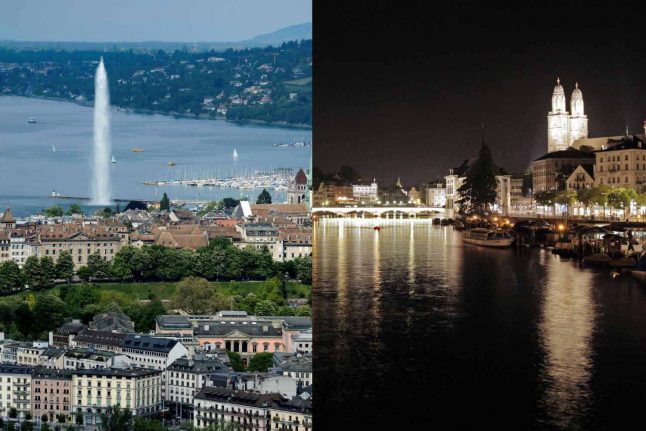New York or Los Angeles. Sydney or Melbourne. Hamburg or Berlin. Like many countries, picking between the two major cities often turns into a contest of culture, a question of lifestyle and a matter of preference.
In Switzerland, with its geographical, cultural and linguistic diversity, these differences are perhaps more pronounced than in most countries.
READ MORE: ‘Great salaries, no warmth’ – your guide to living in Geneva
While Zurich and Geneva are both quintessentially Swiss cities which represent the many faces of this diverse nation, there are also a number of significant differences between the two.
So whether you’re thinking of moving, keen for a holiday or just want to have some more ammunition to throw at any rival Genevois or Zürchers you may know, these are the six big differences between Switzerland’s two major cities.
READ MORE: The best and worst things about living in Zurich
1. Language
The first – and the most obvious difference – between the two cities is the language. In Geneva, French is spoken, while in Zurich it is German (or Swiss German, to be exact).
As with any larger (or indeed smaller) Swiss city, the majority of people are likely to be multilingual, so for travellers and new arrivals, communication won’t be too difficult.
But the differences in language do flow into a range of other cultural characteristics, primarily from Zurich and Geneva being heavily influenced by Germany and France respectively.
While there are of course significant differences between French-speaking Switzerland and France – and from German-speaking Switzerland and Germany – these linguistic differences do end up influencing the experience of visiting the cities themselves.
Which brings us to…
2. Attitude
While generalizations are made to be broken, Genevans are known for being a tad more laid back than Zürchers.
Whereas residents of Geneva are likely to take more time for anything from preparing food to engaging in small talk, their Zurich counterparts are a little more efficient with their time – and sometimes their emotions.
While it’s common to see Geneva residents out for a stroll, no matter what time of day it is, everyone in Zurich seems to be in a hurry.
That said, the younger residents of each city have far more in common than previous generations and look to be trying to leave stereotypes behind.
3. Size
The two cities rank as first and second in Switzerland, but Zurich is significantly bigger. Zurich boasts more than 1.3 million residents – roughly 15 percent of the country’s entire population – while Geneva has approximately 500,000.
Geneva is also geographically much smaller than Zurich – the population density of Zurich is two thirds higher – making Geneva much easier to get around.
4. Quintessentially Swiss; unabashedly global
Zurich is headquarters to many of Switzerland’s largest companies – think Credit Suisse, UBS and, um, Zurich Insurance Group – and is very much a large Swiss town. With its Swiss architecture and variety of traditional food options, if you find yourself in Zurich, you’ll have few doubts about where you really are.
Geneva is headquarters of a number of international organisations, including the World Trade Organisation, the World Health Organization and the International Committee of the Red Cross, giving the city a truly global feel. Any number of languages can be heard while walking the streets each day and this international flavour can be tasted in the city’s food scene.
While Zurich possesses an international feel which would be foreign to many other large European cities, Geneva’s diversity is something truly unique.
5. Nightlife
While Geneva might be more laid back, it’s Zurich where you can really let your hair down. Zurich has a far livelier club and bar scene than Geneva, whether it be during the week or on the weekends.
One of the major reasons is that when Zurich residents finish work, they can easily head to bars, clubs and pubs near their work or near their homes. In Geneva, the 100,000 or so ‘frontaliers’ who live in France but travel into the city to work each day bring their party spirit home with them when they leave.
Not into the pub scene? Zurich’s parks come alive in summer, not least because the city allows consumption of alcohol in public places – whereas in Geneva it needs to be kept strictly indoors.
6. Weather
Geneva is on average 1-2 degrees warmer than Zurich throughout the year, although both experience warm summers and cold winters. In summer, Zurich’s river/lake swimming and lido culture comes alive.
Travel: How to save money while visiting Switzerland
It’s also possible to swim in Lake Geneva, which is a popular summer destination. It’s not forbidden to swim in the lake throughout winter, although the chilly temperatures might scare you off even before you head to the beach.




 Please whitelist us to continue reading.
Please whitelist us to continue reading.
Member comments